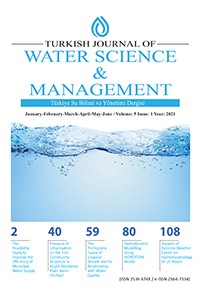Öz
Kaynakça
- Acreman, M., Aldrick, J., Binnie, C., Black, A., Cowx, I., Dawson, H., Dunbar, M., Extence, C., Hannaford, J., Harby, A., Holmes, N., Jarritt, N., Old, G., Peirson, G., Webb, J., & Wood, P. (2009). Environmental flows from dams: the water framework directive. Proceedings of the Institution of Civil Engineers - Engineering Sustainability, 162(1), 13–22. https://doi.org/10.1680/ensu.2009.162.1.13
- Adger, W. N., & Brown, K. (1993). A UK greenhouse gas inventory: On estimating anthropogenic and natural sources and sinks. Sweden.
Öz
In this study, we assessed the effects of extreme weather events on Hydro-morphological Quality Elements in rivers of the United Kingdom alongside other pressures that will provide significant challenges for the implementation of the Water Framework Directive in the UK in terms of cost-effectiveness and sustainability. While observed meteorological data and river data sets were used for assessing changes in river systems and weather patterns, for future assessments, UK Climate Projections 2018 data was used. The studies in the literature have shown that during periods of extreme events, the river hydro-morphology is affected especially in terms of river flows, sediments and riparian zones such as draughts, and intense and heavy rainfall leading to reduced or exceptionally high flow respectively. Reduced flows can lead to the loss of habitat of aquatic organisms and an increase in fish deaths. Whilst increased river flows lead to changes of the hydro-morphology of rivers including changes to sediment dynamics and channels, rivers are also under negative effects of anthropogenic hydro-morphological pressures such as building dams and water abstractions. Furthermore, changes in river hydro-morphology can cause other problems such as increasing water temperature and decreasing dissolved oxygen, and thereby degrading Biological Quality Elements and Physico-Chemical Quality Elements. To deal with and mitigate these problems, a holistic view of water policy that considers climate change projections, reduces water demand, changes agricultural and urban land use practices, improves water availability and quality is required.
Anahtar Kelimeler
extreme weather events climate change water framework directive ecological quality status river hydro-morphology
Kaynakça
- Acreman, M., Aldrick, J., Binnie, C., Black, A., Cowx, I., Dawson, H., Dunbar, M., Extence, C., Hannaford, J., Harby, A., Holmes, N., Jarritt, N., Old, G., Peirson, G., Webb, J., & Wood, P. (2009). Environmental flows from dams: the water framework directive. Proceedings of the Institution of Civil Engineers - Engineering Sustainability, 162(1), 13–22. https://doi.org/10.1680/ensu.2009.162.1.13
- Adger, W. N., & Brown, K. (1993). A UK greenhouse gas inventory: On estimating anthropogenic and natural sources and sinks. Sweden.
Ayrıntılar
| Birincil Dil | İngilizce |
|---|---|
| Bölüm | TÜRKİYE SU BİLİMLERİ VE YÖNETİMİ DERGİSİ |
| Yazarlar | |
| Yayımlanma Tarihi | 20 Ocak 2021 |
| Yayımlandığı Sayı | Yıl 2021 Cilt: 5 Sayı: 1 |


